Canadian seniors were the only age group to see an increase in cannabis use after legalization. The elderly face more frequent health issues, such as chronic pain and arthritis. This article explores how medical cannabis may potentially help.
Seniors Are Fastest-Growing Cannabis-Using Demographic
It may come as a surprise, but the elderly population is embracing medical cannabis in record numbers. It’s estimated that more than 150,000 Canadian seniors rely on medical cannabis to manage their arthritis. In the United States, the amount of seniors who use cannabis now is seven times higher than what it was ten years ago. Between 2006 and 2013, the National Survey on Drug Use and Health reported that cannabis use among people aged 65 and older rose by an astounding 250 percent. The older generation is making their preference for cannabis loud and clear.
But what is causing this late-stage surge in cannabis adoption among the elderly?
Why More Seniors Are Exploring Medical Cannabis
One explanation for the elderly using cannabis is that ageing populations are naturally more susceptible to physical and mental health issues. For example, many seniors experience arthritis and lower back pain and require analgesic pain relievers to keep their pain in check. Some painkillers, such as opioids which are useful in the short-term, bring their host of problems from misuse, abuse, and addiction potential. As a result, medical cannabis is quickly gaining favour as an alternative treatment for chronic pain, neuropathic pain, and depression, to name a few.
Another reason for seniors’ budding interest in medical cannabis has all to do with the sheer size of their “Baby Boomer” generation. Boomers got their name from the explosion of birth rates following World War 2. As legions of baby boomers trickle into senior citizenry during the next decade, this migration will put a strain on healthcare systems with many seniors requiring numerous prescriptions to treat various ailments. Medical cannabis will continue to play an increasingly pivotal role in helping reduce patient symptoms of chronic pain, insomnia, depression, anxiety, and more.

Medical Cannabis Use Projected to be Huge Among Baby Boomers
Widespread cannabis legalization has resulted in a significant uptick of cannabis use among older generations. Figures from Statistics Canada report 5.3 million people using cannabis after legalization. This amount is an increase from the 4.1 million people using cannabis before legalization. The growth came from men aged 45 to 64. Half of these users reported using cannabis as a form of medicinal treatment.
These statistical insights are telltale signs that widespread legalization is stimulating and encouraging cannabis use with older generations. With the stigma around cannabis starting to fade, more seniors are seeking out medical cannabis to address their health needs. With this in mind, this article will help educate seniors on responsible cannabis usage. We’ll weigh out both the benefits and risks of medical cannabis to ensure that seniors have a safe and healthy experience.
How Medical Cannabis Can Assist Seniors with Physical Decline
At more than six million strong, the senior demographic in Canada looms large. By the year 2024, one of five Canadians will be aged 65 and older, as per Statistics Canada. By 2036, seniors could potentially make up 23% to 25% of the total population.
Modern medical technology and healthier lifestyles are translating into longer lives. Today’s seniors are living longer than any generation before them. However, despite leaps in longevity, the natural ageing process still brings about inevitable physical and mental decline. Here’s how medical cannabis can help.
 Helping the Elderly with Chronic Pain
Helping the Elderly with Chronic Pain
Chronic pain becomes more frequent as people age. Chronic pain is also the number one reason for medical cannabis prescriptions. For the elderly, chronic pain can come in various forms such as rheumatoid arthritis, muscle spasms, joint pain, neuropathic pain, and pain caused or aggravated by injury or disease. Seniors living with chronic pain for prolonged periods are more likely to also suffer from depression.
As per Health Canada, 25% to as much as 75% of older adults experience some chronic pain. Seniors have overwhelmingly indicated pain control as a crucial factor in health care.
Medical Cannabis Pain Study Involving 2,736 Seniors With Cancer and Chronic Pain
A study led by Ran Abuhasira and his team that was published in the European Journal of Internal Medicine examined the safety aspects and efficacy of medical cannabis in the elderly. From January 2015 to October 2017, researchers asked 2736 senior patients to answer a detailed questionnaire about medical cannabis and its impact on their conditions of chronic pain and cancer. Here are the results:
- After six months, 93.7% of senior participants said their pain conditions had improved
- At the six month mark, 18.1% discontinued using opioid painkillers or reduced their medications
- Pain scores on a scale of 0 – 10 fell from a median score of 8 to a median score of 4.
Human studies involving cannabis, especially with the elderly, are in very short supply. While the findings from this study indicated the positive potential of medical cannabis, researchers have acknowledged that more rigorous testing is needed.
“Our study finds that the therapeutic use of cannabis is safe and efficacious in the elderly population. Cannabis use may decrease the use of other prescription medicines, including opioids. Gathering more evidence-based data, including data from double-blind randomized-controlled trials, in this special population is imperative.”
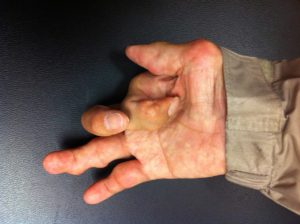 Alleviating Pain Symptoms of Rheumatoid Arthritis
Alleviating Pain Symptoms of Rheumatoid Arthritis
Rheumatoid arthritis is an inflammatory disease where the body’s immune system mistakenly attacks the joints in the hands and feet. The result is painful swelling, stiffness, and possible joint deformity. Treatment involves the use of therapeutic braces, pain medications, and sometimes even surgery. Since 2001, medical cannabis has been recognized as a legal and viable form of treating arthritis-related symptoms. Currently, roughly two-thirds of patients in Canada use medical cannabis in managing arthritis.
Study on Cannabis-Based Medicine and Rheumatoid Arthritis
Drawing from a study published in the U.S National Library of Medicine, Dr. Blake, and his team of researchers assessed the efficiency of Sativex on reducing pain symptoms of rheumatoid arthritis. Sativex is a synthesized form of oral cannabis spray that is used to treat neuropathy, spasticity, and signs of multiple sclerosis. Researchers observed improvements in pain when moving, pain when resting, and quality of sleep.
“In the first ever controlled trial of a Cannabis-Based medicine in Rheumatoid Arthritis, a significant analgesic effect was observed and disease activity was significantly suppressed following Sativex treatment. Whilst the differences are small and variable across the population, they represent benefits of clinical relevance and show the need for more detailed investigation in this indication.”
 Topical Cannabis Creams Effective for Osteoarthritis Arthritis
Topical Cannabis Creams Effective for Osteoarthritis Arthritis
This condition shares similarities with rheumatoid arthritis in that it affects joints in the hands, hips, spine, and knees. However, unlike rheumatoid arthritis, osteoarthritis develops from lifelong mechanical wear and tear. Both forms of arthritis may benefit from the anti-inflammatory properties of medical cannabis.
With cannabis-infused topical creams set to arrive sometime in December 2019, patients will have an effective means of treating pain in a localized area. Presently, seniors with pain issues can decide to use cannabis in liquid forms, gel capsules, and edibles.
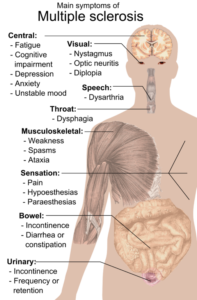 Multiple Sclerosis and Cannabis-Based Medicine
Multiple Sclerosis and Cannabis-Based Medicine
Canada has the distinction of having one of the largest global populations affected by multiple sclerosis (MS). MS is an unpredictable autoimmune disorder that affects the central nervous system. Symptoms include severe loss of coordination, vision problems, muscle spasms, pain, fatigue, numbness, bladder dysfunction, balance problems, and cognitive impairment.
The MS Society of Canada supports the use of medical cannabis in treating symptoms of multiple sclerosis. Many U.S states also include MS as a qualifying condition for medical cannabis. Canadian patients have been using medical cannabis to treat MS for decades.
Research Study of 66 MS Patients
A 5-week study headed by David J. Rog, BMBS and Turo J. Nurmiko, Ph.D. studied around the effects of cannabis with 66 patients living with multiple sclerosis. After conducting a randomized, double-blind, placebo-controlled study, they concluded that:
“Cannabis-based medicine is effective in reducing pain and sleep disturbances in patients with multiple sclerosis related central neuropathic pain and is mostly well tolerated.”
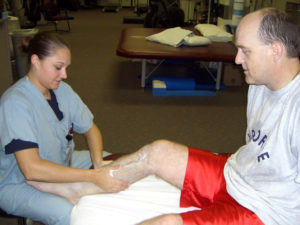
Diabetic Neuropathy
The elderly comprise nearly 48% of the total amount of people with diabetes. One consequence of diabetes is diabetic neuropathy, which compromises the nerves that transmit signals from the hands and feet. This type of diabetic-induced nerve pain manifests as numbness or tingling. It can also feel like a sharp or aching pain.
A small study headed by Dr. Mark Wallace and published in the National Center for Biotechnology Information assessed 16 participants with diabetic neuropathy and the efficacy of cannabis. Although more testing is needed, preliminary findings indicated that inhaled cannabis had a positive effect on reducing diabetic nerve pain.
 Cancer and Palliative Care
Cancer and Palliative Care
The likelihood of developing cancer increases with age. The senior demographic makes up 60% of all people who have the disease, with the most common cancers being prostate cancer, lung cancer, bowel cancer, and breast cancer. The treatment of cancer can include chemotherapy, radiation therapy, immunotherapy, and surgery.
Chemotherapy can cause unpleasant side effects like nausea, vomiting, appetite loss, depression, and insomnia – all of which can be mitigated and managed by medical cannabis. At the palliative care stage where controlling cancer pain is a central priority, potent opioid medications like Oxycontin and morphine can prove to be too detrimental for seniors and compound morbidity. In this case, medical cannabis can be used as an adjunct treatment to keep cancer pain under control while also reducing the total amount of pain medications.
Elderly cancer patients aren’t as resilient as younger demographics, and so special attention must be paid to ensure their wellness. Medical cannabis can provide safe solutions for appetite stimulation, pain management, sleep quality, and quality of life.
How Medical Cannabis Can Help Seniors with Mental Health Issues
Seniors will face declining health issues that come with ageing such as arthritis, mobility problems, bone shrinkage, muscle loss, and vision and hearing impairment. However, elderly difficulties aren’t limited to only physical issues.
With old age comes the experience of loss. Whether it’s sadness over the death of loved ones, or the gradual loss of one’s freedom and personal autonomy, the emotional damage can weigh heavily on seniors.
Bereavement and Depression
The elderly deal with difficult existential challenges as they age. Retirement can cause seniors to feel socially isolated and unproductive. The loss of a spouse can cause intense feelings of loneliness. The fact that their children are all grown up and have all left the nest can contribute to feelings of disconnection, alienation, and solitude.
While grief is a natural and healthy response to dealing with loss, prolonged periods of sadness can devolve into a chronic depression that is harmful to seniors’ overall quality of life. Medical cannabis is known for its anti-anxiety benefits as well as boosting the quality of life in small and controlled doses. Seniors should work closely with their healthcare practitioner to determine the right amounts of CBD and THC concentrations to ease their emotional pain.
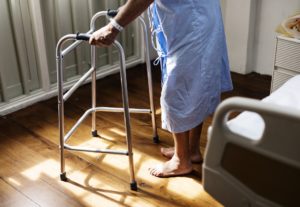 Responsible Cannabis Use for the Elderly
Responsible Cannabis Use for the Elderly
Falls Prevention
Falling is the number one cause of injury and death among the elderly. While cannabis can offer many welcome aids in terms of physical and mental wellness, it is not without its risks. Side effects of cannabis can potentially include dizziness, disorientation, and drowsiness – all of which can contribute to falling.
The Medical Cannabis System Is Made for Patient Safety
Seniors must educate themselves on the possible hazards of cannabis use. The medical cannabis system exists for the sole reason to help and monitor patients. We urge seniors to regularly work with their healthcare practitioners to ensure optimum personal safety.
Guidelines for Responsible Cannabis Use for Seniors
- “Start low, go slow” This mantra is an essential rule on how to consume cannabis. Seniors should start with a minimal dose and give themselves plenty of time to see how they feel before administering another dose. Too high of a dose can generate unpleasant effects.
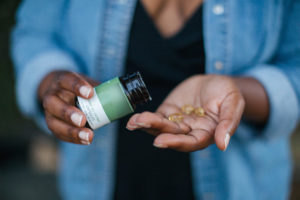 Seniors have slower digestive systems and may take more time to process cannabinoids. Seniors should keep this fact in mind when consuming cannabis oil, oral sprays, gel capsules, and especially edibles.
Seniors have slower digestive systems and may take more time to process cannabinoids. Seniors should keep this fact in mind when consuming cannabis oil, oral sprays, gel capsules, and especially edibles.- Medical cannabis may cause unpredictable drug interactions with existing drugs. For example, medications prescribed for high blood pressure could be augmented or delayed when taken with cannabis. Seniors should first consult with their healthcare practitioner to be on the safe side.
- We do not recommend seniors smoking cannabis, but rather explore many smokeless options such as cannabis gel capsules, oils, tinctures, and oral sprays. Cannabis oil can also be used to infuse meals and drinks. Seniors should refrain from smoking cannabis since smoking can aggravate the lungs as well as pose unnecessary health risks. Dosing is also more consistent with cannabis capsules and oils. However, senior should know that the onset of effects with oils, pills, and sprays can take anywhere from 1 hour to 3 hours.
- When consuming cannabis, seniors should be in a safe environment, such as their residence. Seniors should always have a way to communicate in case of an emergency.









